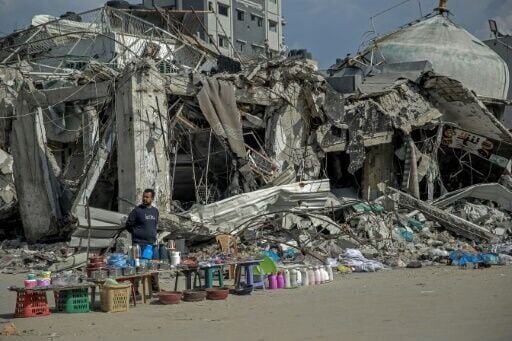
GAZA STRIP, Palestinian Territories, Feb 26, 2024 (BSS/AFP) - Israel said
Monday its army had readied a plan to evacuate Gazans ahead of a feared
invasion of far-southern Rafah, which the UN chief warned would "put the final nail in the coffin" of aid operations.
UN Secretary-General Antonio Guterres said that Rafah -- where 1.4 million Palestinians live in crowded shelters near the Egyptian border -- is also "the core of the humanitarian aid operation" in the besieged Gaza Strip.
In another shock impact of the almost five-month-old war, Palestinian prime minister Mohammad Shtayyeh in the occupied West Bank handed in his government's resignation to the head of the Palestinian Authority, president Mahmud Abbas.
Shtayyeh cited "the new reality in the Gaza Strip" and "the escalation in the West Bank and Jerusalem", where deadly violence has surged since the Israel-Hamas war began on October 7 with the Palestinian group's attack.
Israel's top ally Washington and other powers discussing a post-war Gaza have called for a reformed Palestinian Authority to take charge of both the West Bank and Gaza, which has been ruled by Hamas since 2007.
Shtayyeh urged intra-Palestinian consensus after years of rift and the
"extension of the Authority's rule over the entire land of Palestine".
Heavy fighting raged on in Gaza, where Israeli forces launched strikes and ground operations, killing 92 people overnight according to the Hamas-ruled territory's health ministry.
Displaced Gazan Sharif Muammar said he had helped to pull his son's body of from the rubble in Rafah.
"There was no one here -- only children, they are all children," he told AFP.
"There were no fighters at all. We weren't launching missiles... We barely live."
- 'Total victory' -
Israel's military campaign has killed at least 29,782 people in Gaza, mostly women and children, according to the ministry.
The war broke out after Hamas launched their unprecedented attack which
killed 1,160 people in Israel, mostly civilians, according to an AFP tally of official figures.
Militants also took about 250 hostages, 130 of whom remain in Gaza,
including 31 presumed dead, according to Israel.
Israeli Prime Minister Benjamin Netanyahu stressed Sunday that, despite
ongoing talks toward a ceasefire, the army will launch a ground invasion of Rafah to achieve "total victory" over Hamas.
Once land operations are launched there, an Israeli victory would be "weeks away", he said, adding that any truce deal would delay, not prevent, the operation.
On Monday Netanyahu's office said the military had shown Israel's war
cabinet its plan for evacuating civilians from Rafah.
But no details have been released on where those displaced people could go in war-torn Gaza.
Neighbouring Egypt has built a large walled enclosure next to Gaza, but
Cairo has denied any plans to allow the mass flight of refugees across the border.
Foreign governments and aid groups have issued dire warnings that a Rafah
invasion would inflict mass casualties.
Guterres warned "an all-out Israeli offensive on the city would not only be terrifying for more than a million Palestinian civilians sheltering there; it would put the final nail in the coffin of our aid programmes".
He said that "nothing can justify Hamas's deliberate killing, injuring,
torturing and kidnapping of civilians" and "nothing justifies the collective punishment of the Palestinian people."
- 'No food' -
Desperate families in Gaza's north have had to scavenge for food as most aid trucks have been halted there, with many people eating animal fodder and the meat of slaughtered horses.
"We have no food or drink for ourselves or our children," Omar al-Kahlout told AFP, as he waited near Gaza City for aid trucks to arrive.
Amid the spiralling crisis, the UN aid agency for Palestinians, UNRWA, has urged political action to avert famine.
Dire food shortages in northern Gaza are "a man-made disaster" that can be mitigated, said Philippe Lazzarini, UNRWA chief.
"Famine can still be avoided through genuine political will to grant access and protection to meaningful assistance."
Aid entering Gaza has halved in February from the previous month, he said.
Mediators meanwhile continued stuttering negotiations towards a ceasefire
and hostage release deal, with hopes it can be in place before the start of the Muslim holy month of Ramadan in about two weeks.
Media reports suggest the warring parties are weighing a six-week halt to
fighting and the initial exchange of dozens of hostages for several hundred Palestinian detainees held by Israel.
An unnamed Israeli official told news site Ynet the "direction is
positive", and Israeli media reported that military and intelligence officials were headed to Qatar for further talks on a deal.
Qatar's Emir Sheikh Tamim bin Hamad Al-Thani, whose country hosts Hamas
leaders and helped broker a one-week truce in November, is due in Paris this week, the French presidency said.
Sheikh Tamim has met Hamas chief Ismail Haniyeh in Doha and discussed
efforts "aimed at reaching an immediate and permanent ceasefire agreement" in Gaza, the official Qatar News Agency said.
Jordan's King Abdullah II warned that fighting during Ramadan "will
increase the threat of expanding the conflict" which has drawn in armed groups elsewhere in the Middle East.
Israel has for months exchanged near-daily cross-border fire with Lebanon's Iran-backed Hezbollah.
Israeli strikes near the Hezbollah-dominated city of Baalbek killed two
group members Monday, security sources told AFP, in the first strikes on
Lebanon's east since clashes began after the Gaza war.
Israel confirmed the strike and said it targeted sites used by Hezbollah
for its aerial defence system, in retaliation for a missile that downed an Israeli drone earlier on Monday.